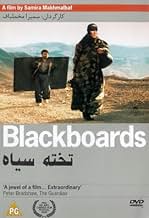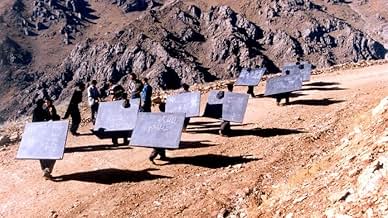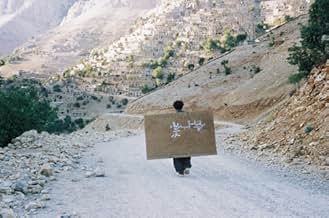Takhté siah
- 2000
- 1 घं 28 मि
IMDb रेटिंग
6.8/10
3 हज़ार
आपकी रेटिंग
अपनी भाषा में प्लॉट जोड़ेंKurdish teachers Said and Reeboir roam Iranian villages near Iraqi border during war. Said guides displaced men, marries widow Halaleh. Reeboir joins child smugglers. Amid danger, they try t... सभी पढ़ेंKurdish teachers Said and Reeboir roam Iranian villages near Iraqi border during war. Said guides displaced men, marries widow Halaleh. Reeboir joins child smugglers. Amid danger, they try teaching nomadic students while soldiers patrol.Kurdish teachers Said and Reeboir roam Iranian villages near Iraqi border during war. Said guides displaced men, marries widow Halaleh. Reeboir joins child smugglers. Amid danger, they try teaching nomadic students while soldiers patrol.
- निर्देशक
- लेखक
- स्टार
- पुरस्कार
- 3 जीत और कुल 3 नामांकन
फ़ीचर्ड समीक्षाएं
I have nothing against slow movies -- for instance kiarostami is a huge favorite of mine. But I have to admit, this film really pushes the slow-and-obtuse envelope. it's mainly the script. the teachers encounter various nomads and desperately harangue them to hire them as teachers... when people refuse, they just repeat themselves again and again, and it seems that nobody really listens to anyone else. it's a study in harshness. it leans heavily on symbolism, and you feel that the whole thing is totally constructed by the filmmaker, that no respect at all is being paid to naturalism or the kinds of reactions that people would likely have in a situation like this. so, if you're really excited by a symbol-filled, quite stark time, you will appreciate this. I wasn't up for it.
'Blackboards' is one of those films that has divided audiences between fanatical admirers and grumbling dissenters. The former admire the director's skilful juggling between formalism and humanism, individual quests and social movements, private moments and public set-pieces; her filming of landscape; her eliciting of unsentimental, compelling performances from an amateur cast; her insistence on enigma and loose ends; her portrait of life in extreme, harrowing conditions. The dissenters bemoan her fudging of politics - sure, she shows the exploitation of children, the mass displacement of the Kurds, and the murderous terror lurking behind every rock, but by refusing to put these in a contextual framework, such depictions are blunted in political force.
there is a whiff of misogyny to me in these complaints. It's okay for men to make ambitious, universalising statements, but women must remain concerned with the local. Presumably Makhmalbaf would have been more political if she had concentrated on authenticating the patterns on the women's dresses. Of course, culture in general has moved towards the local: with post-modernism, very few artists have had the confidence to think on a large scale (I don't mean make large-scale films, which any fule kan do).
This is presumably why 'Blackboards' reminds me of older types of artists. Most immediately, it could be a massive Beckett play, full of wandering vagrants in a vast, desolate landscape, peopled with Lucky-like slaves, surrounded by an unseen, God-like menace, occasionally erupting in capricious violence. Like Beckett, there is no real beginning or end, no context, just a sense of never-ending repetition with the only possible relief in death.
Like Beckett (eg 'Waiting for Godot'), culture has no place in such an environment, indeed, seems a grotesque irrelevance, an incomprehensible babble, traces scraped in a landscape no-one can read now, never mind in the future. And yes, the film is as unremittingly hopeless as a Beckett play - there is no progress or redemption here. But it is as bleakly funny too - eg the whole marriage farrago between Said and Hahaleh; the game of marbles watched by her son; the tragicomic, very Beckettian inability of her aged father to relieve himself.
In the film world, 'Blackboards' reminds me of no-one so much as Angelopolous, especially in a film like 'The Travelling players', where a group of itinerant outsiders observe and become absorbed in an unfamiliar community. Makhmalbaf has Angelopolous' confidence in allegory, a way of dramatising in mythic form life and displacement under a totalitarian regime, without in any way 'abstracting' the violence and pain.
The empty landscapes suddenly being inexplicably over-run by faceless crowds also has the millenarial feel of Andersen's recent 'Songs from the second floor', or later Bunuel, from whom the theme of the journey, coming across strange, surreal strangers (eg the uncanny scene with the masked gardener whose son languishes in an Iraqi jail), or images such as the blackboard-hauling men like grounded birds watching blackbirds in the sky, and overhearing another, ominous, unseen flying object, derives. There are many, many ways of being political.
Unlike these masters, however, who prefer irony and distant tableaux, Makhmalbaf, through restless handheld camerawork, gets right in between her characters and makes us feel for them.
there is a whiff of misogyny to me in these complaints. It's okay for men to make ambitious, universalising statements, but women must remain concerned with the local. Presumably Makhmalbaf would have been more political if she had concentrated on authenticating the patterns on the women's dresses. Of course, culture in general has moved towards the local: with post-modernism, very few artists have had the confidence to think on a large scale (I don't mean make large-scale films, which any fule kan do).
This is presumably why 'Blackboards' reminds me of older types of artists. Most immediately, it could be a massive Beckett play, full of wandering vagrants in a vast, desolate landscape, peopled with Lucky-like slaves, surrounded by an unseen, God-like menace, occasionally erupting in capricious violence. Like Beckett, there is no real beginning or end, no context, just a sense of never-ending repetition with the only possible relief in death.
Like Beckett (eg 'Waiting for Godot'), culture has no place in such an environment, indeed, seems a grotesque irrelevance, an incomprehensible babble, traces scraped in a landscape no-one can read now, never mind in the future. And yes, the film is as unremittingly hopeless as a Beckett play - there is no progress or redemption here. But it is as bleakly funny too - eg the whole marriage farrago between Said and Hahaleh; the game of marbles watched by her son; the tragicomic, very Beckettian inability of her aged father to relieve himself.
In the film world, 'Blackboards' reminds me of no-one so much as Angelopolous, especially in a film like 'The Travelling players', where a group of itinerant outsiders observe and become absorbed in an unfamiliar community. Makhmalbaf has Angelopolous' confidence in allegory, a way of dramatising in mythic form life and displacement under a totalitarian regime, without in any way 'abstracting' the violence and pain.
The empty landscapes suddenly being inexplicably over-run by faceless crowds also has the millenarial feel of Andersen's recent 'Songs from the second floor', or later Bunuel, from whom the theme of the journey, coming across strange, surreal strangers (eg the uncanny scene with the masked gardener whose son languishes in an Iraqi jail), or images such as the blackboard-hauling men like grounded birds watching blackbirds in the sky, and overhearing another, ominous, unseen flying object, derives. There are many, many ways of being political.
Unlike these masters, however, who prefer irony and distant tableaux, Makhmalbaf, through restless handheld camerawork, gets right in between her characters and makes us feel for them.
Blackboards is a very good film: well acted and engaging. The story is fresh: a group of Iranian teachers with blackboards on their backs, trying to each undereducated Kurdish refugees how to read, write, count, et cetera.
The film is filled with endearing characters: a sharp young boy working as a mule, a teacher desperately trying to teach those around him, an old man with urinary problems, a woman whose chaotic life has been extremely painful and just wants to be able to hold on to her son. Samira Makhmalbaf has revealed herself as a humane filmmaker with a good eye for drama in everyday life. The film is honest in its vision of a world where reading and writing seem so useless, where the only thing that matters is the ability to keep on moving. That is what makes the teachers' attempts to teach the many refugees so pathetic. I feel that a good filmmaker like Makhmalbaf, someone who has a story to tell and knows how to tell it, is better than the dozens of pretensions auteur filmmakers with their overblown visions and obnoxiously pointless powerhouse melodrama.
The film is filled with endearing characters: a sharp young boy working as a mule, a teacher desperately trying to teach those around him, an old man with urinary problems, a woman whose chaotic life has been extremely painful and just wants to be able to hold on to her son. Samira Makhmalbaf has revealed herself as a humane filmmaker with a good eye for drama in everyday life. The film is honest in its vision of a world where reading and writing seem so useless, where the only thing that matters is the ability to keep on moving. That is what makes the teachers' attempts to teach the many refugees so pathetic. I feel that a good filmmaker like Makhmalbaf, someone who has a story to tell and knows how to tell it, is better than the dozens of pretensions auteur filmmakers with their overblown visions and obnoxiously pointless powerhouse melodrama.
It must hard to talk about ignorance, poverty and war without being realistic. I reckon that, most of everything, this film is "realistic". It is undeniable that the settings, the characters and the issues belong to the director's background. She's been able to give "a hint of poetry" thanks to several touching and clever shots (For instance: A family that finds protection under a blackboard). I'm afraid that this film looses part of its potential because of its hybrid nature. It's not a drama, but it's not a documentary either. There are few stories crossing each other, but it is not complex enough to consider it a "Magnolia-style" thing. Finally (and this is what the film seems to be about), there's a teacher who dreams to heal his country with education but ends up facing the bitterness of a failed relationship. Nevertheless I truly appreciated the very last scene, that is worth 2 points in my final vote.
Iacopo Destefani
Iacopo Destefani
This is a rather well made movie, that shows some of the problems in Iran that affects its poor northern citizens, without luckily ever getting over-dramatic or too sentimental but at the same time it's also lacking in true depth to make this a powerful or impressive movie.
It's a slow moving movie that is entirely filmed with handhold camera, with lots of long sequences. It works good for a realism and the atmosphere of the whole movie but at the same time means that this is not a movie for just everyone. You must be able to handle the slow- and different way of storytelling to appreciate this movie fully.
The movie is good looking, with its moody, never-ending, landscapes and good camera positions to tell the story with. The dialog is realistic, though not always interesting. I mean they basically say the same things five times in a row in this movie, which perhaps is a bit irritating. This is also due to the non-professional actors that play in this movie. Needless to say that not everything works out fully in this movie, especially when it comes down to the true emotion or depth of the movie. Lucklily there is no lack of realism, although the movie its story pushes it at times. But on the other hand it's the story that still makes this a pleasant movie to watch. The subject might be heavy and serious but luckily the movie doesn't try to emphasis this. The end result is a good and not heavy to watch movie that is absolutely worth seeing but lacking in real emotions or depth to make a true lasting impression.
The movie is told from an original point of view; A couple of schoolteachers that travel trough the North of the country to remote villages and groups of refugees, to teach them the basic things such as writing, reading and simple math, to try and give everyone a better future and at the same time earn some money or get some free food as well. They're mixed up in all the difficulties but yet they're no part of it. If they want they can walk away from all the troubles if they choose to. They're objective in the whole situation and they don't do more than is ever asked of them.
Most of the characters in this movie are being played by non-actors. It works realistic but at the same time is one of the reasons why the movie is lacking in any true depth or well acted out emotions. The movie as a whole is effective and it makes its point well but it does so without ever impressing too much, with the exception of one or two great sequences.
Samira Makhmalbaf has some good and promising potential as a filmmaker and is possible future Oscar potential, just like her father, who also co-wrote this movie but her movies have to become even more confronting and daring if she wants to achieve that.
7/10
http://bobafett1138.blogspot.com/
It's a slow moving movie that is entirely filmed with handhold camera, with lots of long sequences. It works good for a realism and the atmosphere of the whole movie but at the same time means that this is not a movie for just everyone. You must be able to handle the slow- and different way of storytelling to appreciate this movie fully.
The movie is good looking, with its moody, never-ending, landscapes and good camera positions to tell the story with. The dialog is realistic, though not always interesting. I mean they basically say the same things five times in a row in this movie, which perhaps is a bit irritating. This is also due to the non-professional actors that play in this movie. Needless to say that not everything works out fully in this movie, especially when it comes down to the true emotion or depth of the movie. Lucklily there is no lack of realism, although the movie its story pushes it at times. But on the other hand it's the story that still makes this a pleasant movie to watch. The subject might be heavy and serious but luckily the movie doesn't try to emphasis this. The end result is a good and not heavy to watch movie that is absolutely worth seeing but lacking in real emotions or depth to make a true lasting impression.
The movie is told from an original point of view; A couple of schoolteachers that travel trough the North of the country to remote villages and groups of refugees, to teach them the basic things such as writing, reading and simple math, to try and give everyone a better future and at the same time earn some money or get some free food as well. They're mixed up in all the difficulties but yet they're no part of it. If they want they can walk away from all the troubles if they choose to. They're objective in the whole situation and they don't do more than is ever asked of them.
Most of the characters in this movie are being played by non-actors. It works realistic but at the same time is one of the reasons why the movie is lacking in any true depth or well acted out emotions. The movie as a whole is effective and it makes its point well but it does so without ever impressing too much, with the exception of one or two great sequences.
Samira Makhmalbaf has some good and promising potential as a filmmaker and is possible future Oscar potential, just like her father, who also co-wrote this movie but her movies have to become even more confronting and daring if she wants to achieve that.
7/10
http://bobafett1138.blogspot.com/
क्या आपको पता है
- कनेक्शनFeatured in Samira cheghoneh 'Takhté siah' rol sakht (2000)
टॉप पसंद
रेटिंग देने के लिए साइन-इन करें और वैयक्तिकृत सुझावों के लिए वॉचलिस्ट करें
- How long is Blackboards?Alexa द्वारा संचालित
विवरण
बॉक्स ऑफ़िस
- US और कनाडा में सकल
- $23,520
- US और कनाडा में पहले सप्ताह में कुल कमाई
- $3,416
- 8 दिस॰ 2002
- दुनिया भर में सकल
- $41,772
इस पेज में योगदान दें
किसी बदलाव का सुझाव दें या अनुपलब्ध कॉन्टेंट जोड़ें









